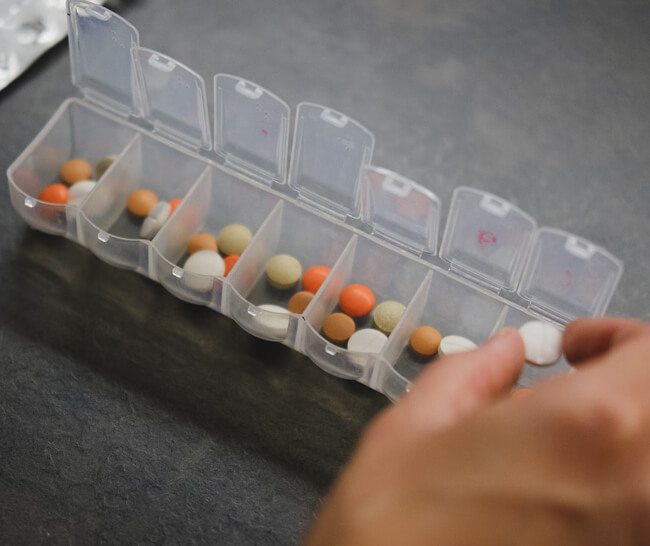If you’ve ever eaten a high carb meal (safe to say that’s everyone), you may have felt really tired right after eating. Or may you feel a burst of energy followed by a crash an hour to so later, leaving you feeling fatigued and lethargic.
Fatigue is a common symptom of type 1 and type 2 diabetes and can impact the quality of life for many who live with this chronic disease.1 When blood sugar gets too high, it can be difficult for insulin (a hormone secreted by the pancreas) to pull glucose from the blood and into cells to give them energy. Oftentimes, a spike in blood sugar (hyperglycemia) leads to a significant dip in blood sugar (hypoglycemia), which can also leave you feeling tired.
In this article, we will dive into why high blood glucose levels make you tired, other symptoms of high blood sugar, and ways to prevent it.
Why Does High Blood Sugar Make You Sleepy?
People with high blood sugar commonly feel tired. Studies show that 61% of those diagnosed with diabetes often feel tired and sluggish.2
Even when people with diabetes take steps to actively manage their blood glucose levels – for instance, engaging in regular exercise, proper nutrition, adequate sleep, and stress management – they may still feel tired. People with normal to prediabetic blood sugar levels can also feel tired when they experience significant spikes in blood sugar.
When blood sugar rises rapidly, the body immediately works to return blood sugar levels to normal. It does this by creating insulin. In diabetes, there either isn’t enough insulin, or the cells do not respond to insulin as they should. This kicks the body into overdrive, and it starts pulling energy from fat.
The body uses energy from the breakdown of the molecule called adenosine triphosphate (ATP). ATP gives off one of three phosphates for energy, and it changes to a different molecule known as adenosine diphosphate (ADP). When ATP cannot regain the phosphate initially lost, this leads to tiredness.3
{{mid-cta}}
Diabetes vs. Fatigue
According to the American Diabetes Association, there are many reasons why diabetes can cause fatigue, including:4,5
- changes in blood sugar levels
- other complications and symptoms of diabetes
- diabetes medication (i.e., metformin) side effects
- mental and emotional issues
- being overweight
Other risk factors that can contribute to diabetes include age, history of smoking, cholesterol levels, and blood pressure levels.6
5 Tips to Manage High Blood Sugar (and Diabetes) Fatigue
If you have high blood sugar, here are some practical tips to avoid feeling tired and increase energy levels with high blood sugar:
Get adequate sleep
Getting at least 8 hours of sleep each night can help to avoid feeling sleepy. If you aren’t currently sleeping this much, try adopting a bedtime routine that may help improve the quality of your sleep. Go to bed and wake at the same time each day, and practice a nightly routine that tells your body and brain that it’s time to catch some zzz’s.
Take care of your mental health
Depression, anxiety, and emotional stress are common factors that are often seen in people with high blood sugar. Taking time out to care for your mental health can prevent exhaustion. Consider seeing a therapist, practicing meditation, or some other form of self-care.
Don’t skip meals
Eating at regular intervals can help keep energy levels stable and prevent tiredness. Avoid skipping meals and eat a balanced meal or snack every 3-4 hours. A balanced meal or snack includes carbohydrates, protein, and fat. For example, cheese, crackers, and turkey, or Greek yogurt, fruit, and granola.
Drink coffee or tea without added sugar
Drinking caffeine-containing beverages can provide you with a boost of energy, but you’ll want to avoid beverages that contain added sugars that will contribute to high blood sugar. Opt for unsweetened teas or use artificial sweeteners like stevia, monk fruit sweetener, or sucralose.

Avoid alcohol
Alcohol can disrupt sleep patterns, so while you may be getting enough sleep, it won’t be good quality sleep. This will cause you to wake up feeling tired and unrested. If you choose to drink, limit yourself to 1-2 servings of alcohol per day. Avoid drinking daily.
6 Ways to Prevent Blood Sugar Spikes and Avoid Fatigue
If you have high blood sugar, there are some things you can do to lower your blood sugar and keep energy levels more stable. Here’s how to prevent blood sugar spikes that can make you feel sleepy:
Eat balanced meals and snacks
Make sure your meals are balanced by including all three macronutrients – carbohydrates, protein, and fat. When carbohydrates are eaten alone without fat or protein, the body quickly digests the carbohydrates and causes blood sugars to spike. Focus on whole foods, like nuts, dairy products, whole grains, fruits, and vegetables.
Exercise regularly
Moving your body on a regular basis can help regulate blood sugar levels. Both high-intensity and moderate-intensity exercise typically deliver the same results, so choose a form of physical activity that you enjoy and can remain consistent with. Just walking for 30 minutes daily can make a huge difference in managing blood sugars.

Swap simple carbs for complex carbs
Eating simple carbs like those from white bread, table sugar, and breakfast cereals can cause spikes in blood sugar because they are quickly and easily digested. Unlike simple carbs, complex carbs are more slowly digested, decreasing the occurrence of blood sugar spikes.
Consume adequate vitamins and minerals
It’s important to consume enough essential vitamins and minerals in your daily diet. Eating a wide variety of foods including lean proteins, fruits, vegetables, whole grains, dairy, nuts, and seeds can help increase your intake of these essential nutrients. If you don’t get enough of these vitamins and minerals in your diet, consider taking a multivitamin.
Specifically, look for a supplement containing magnesium and chromium as studies have shown that combining these two minerals could improve insulin resistance and lessen spikes in blood sugar levels.7
Take time to destress
Chronic stress can contribute to high blood sugar levels.8
To prevent increases in blood sugar that are caused by external stressors (i.e. work, family, life, etc.), find ways to manage stress like therapy, meditation, yoga, or journaling.
Be mindful of the glycemic index (GI) of foods
The glycemic index ranks carbohydrates on a scale from 0 to 100 based on how quickly and how much they raise blood sugar levels after eating. Foods that have a high glycemic index, like white rice, are rapidly digested and cause substantial spikes in blood sugar.
The glycemic index was developed based on how the foods affect blood sugar when eaten alone. If you eat high-GI foods, just add something that has fat and protein to help slow digestion and prevent blood sugar spikes.
Other Symptoms of High Blood Sugar (and Diabetes)
High blood sugar is easy to identify. When caught and managed early on, you can take steps to prevent chronically high blood sugars that can lead to prediabetes, diabetes, and other types of metabolic syndrome.
In addition to fatigue, below are some additional signs of high blood sugar to be aware of:
- Frequent urination
- Increased thirst
- Increased hunger
- Blurred vision
- Frequent infections
- Slow healing wounds
- Irritability
Other Common Causes of Fatigue
Having prolonged periods of fatigue is different from feeling tired or having low energy. Fatigue may make you feel tired, but it will also cause a lack of motivation, low energy, and decreased quality of life. There are many possible causes of fatigue. Fatigue can also occur due to certain lifestyle choices, such as poor diet and physical inactivity.
Along with high blood sugar, other causes of fatigue include:
- Hormonal imbalances
- Anemia
- Chronic conditions causing inflammation
- Stress
- Acute illnesses
- Lack of sleep or poor sleep quality
- Unbalanced diet
- Mental health issues
- Low blood sugar levels
When You Should Reach Out To A Pro
Feeling tired every once in a while is normal and usually shouldn’t cause concern for an underlying health issue. However, prolonged periods of fatigue may indicate something more serious and should be addressed by a health professional.
It’s time to see your healthcare provider if you have been feeling fatigued and:
- can’t think of any reasonable cause of your fatigue
- have an increased body temperature
- have had unexplained or unintended weight loss
- feel very sensitive to colder temperatures
- often have trouble falling asleep and staying asleep
- concerns you may be depressed
If you have made lifestyle changes to address fatigue, including getting adequate sleep, eating a balanced diet, and managing stress, and your fatigue persists for more than two weeks, you should make an appointment with your doctor.
Continuous glucose monitors (CGMs) help monitor and manage blood sugar levels. With a CGM, you can see how meals, exercise, and illness impact glucose levels. CGM wearers are alerted when glucose spikes or drops outside of a specific range. CGMs aren’t just for people who have diabetes. A CGM can help anyone monitor their blood sugar levels to make sure they are within normal limits. Learn more about continuous glucose monitoring with Signos to see how a CGM can help you.
- Item 1
- Item 2
- item 3
Topics discussed in this article:
References
- Singh R, Teel C, Sabus C, McGinnis P, Kluding P. Fatigue in Type 2 Diabetes: Impact on Quality of Life and Predictors. PLoS One. 2016 Nov 8;11(11):e0165652. doi: 10.1371/journal.pone.0165652. PMID: 27824886; PMCID: PMC5100935.
- Goedendorp MM, Tack CJ, Steggink E, Bloot L, Bazelmans E, Knoop H. Chronic fatigue in type 1 diabetes: Highly prevalent but not explained by hyperglycemia or glucose variability. Diabetes Care. 2013;37(1):73-80. doi:10.2337/dc13-0515
- Kalra S, Sahay R. Diabetes fatigue syndrome. Diabetes Therapy. 2018;9(4):1421-1429. doi:10.1007/s13300-018-0453-x
- Type 2 Diabetes - Symptoms (n.d.). American Diabetes Association. https://diabetes.org/diabetes/type-2/symptoms
- Kalra S, Sahay R. Diabetes Fatigue Syndrome. Diabetes Ther. 2018;9(4):1421-1429. doi:10.1007/s13300-018-0453-x
- Bellou V, Belbasis L, Tzoulaki I, Evangelou E. Risk factors for type 2 diabetes mellitus: An exposure-wide umbrella review of meta-analyses. PLoS One. 2018 Mar 20;13(3):e0194127. doi:10.1371/journal.pone.0194127
- Dou M, Ma Y, Ma AG, Han L, Song MM, Wang YG, Yao MX, Sun XF, Li Y, Gao S, Zhang Y. Combined chromium and magnesium decreases insulin resistance more effectively than either alone. Asia Pac J Clin Nutr. 2016 Dec;25(4):747-753. doi:10.6133/apjcn.092015.48
- Wong H, Singh J, Go RM, Ahluwalia N, Guerrero-Go MA. The Effects of Mental Stress on Non-insulin-dependent Diabetes: Determining the Relationship Between Catecholamine and Adrenergic Signals from Stress, Anxiety, and Depression on the Physiological Changes in the Pancreatic Hormone Secretion. Cureus. 2019;11(8):e5474. Published 2019 Aug 24. doi:10.7759/cureus.5474
































